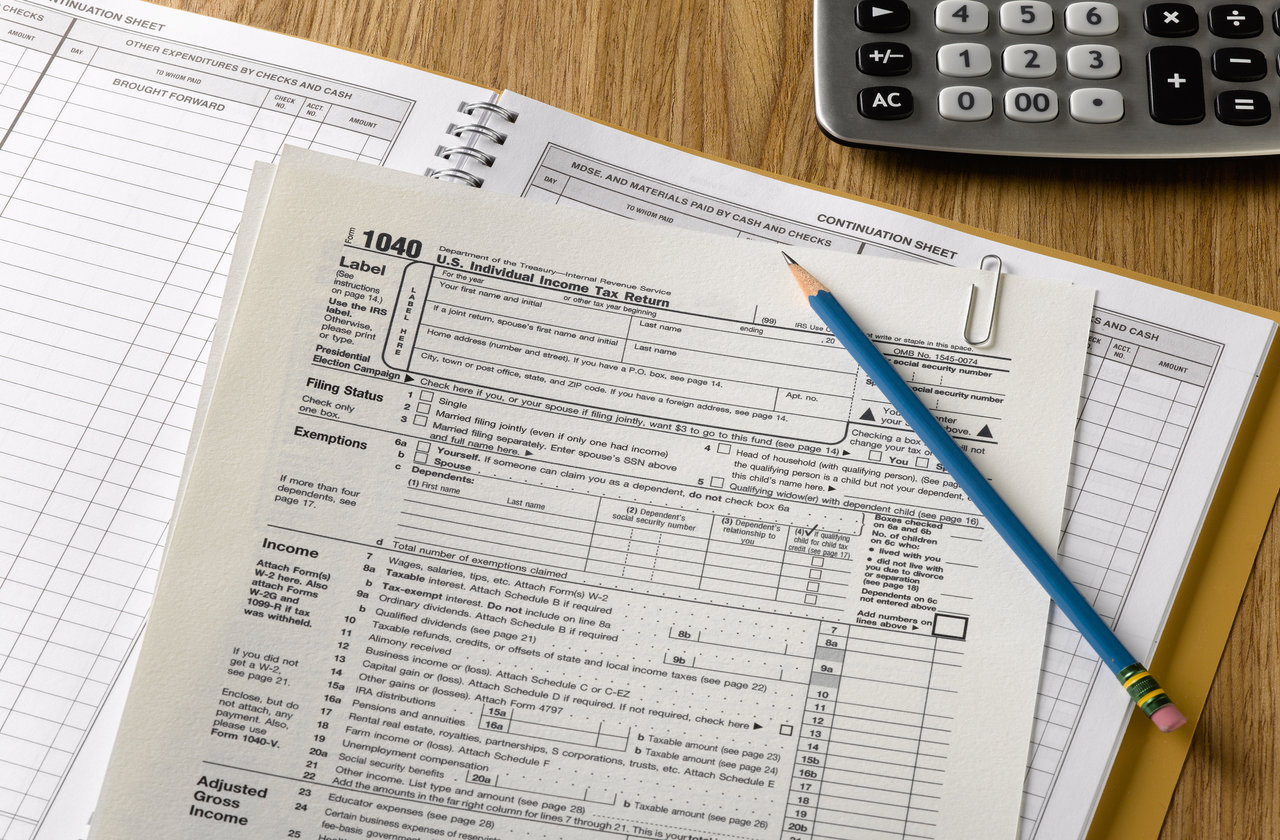Keep More of Your Retirement Savings with Tax-Bracket Planning
Without a comprehensive tax strategy in place, many retirees may pay three times more in taxes than they need to. Avoid that by “filling” your tax bracket. Here’s how.


Profit and prosper with the best of Kiplinger's advice on investing, taxes, retirement, personal finance and much more. Delivered daily. Enter your email in the box and click Sign Me Up.
You are now subscribed
Your newsletter sign-up was successful
Want to add more newsletters?

Delivered daily
Kiplinger Today
Profit and prosper with the best of Kiplinger's advice on investing, taxes, retirement, personal finance and much more delivered daily. Smart money moves start here.

Sent five days a week
Kiplinger A Step Ahead
Get practical help to make better financial decisions in your everyday life, from spending to savings on top deals.

Delivered daily
Kiplinger Closing Bell
Get today's biggest financial and investing headlines delivered to your inbox every day the U.S. stock market is open.

Sent twice a week
Kiplinger Adviser Intel
Financial pros across the country share best practices and fresh tactics to preserve and grow your wealth.

Delivered weekly
Kiplinger Tax Tips
Trim your federal and state tax bills with practical tax-planning and tax-cutting strategies.

Sent twice a week
Kiplinger Retirement Tips
Your twice-a-week guide to planning and enjoying a financially secure and richly rewarding retirement

Sent bimonthly.
Kiplinger Adviser Angle
Insights for advisers, wealth managers and other financial professionals.

Sent twice a week
Kiplinger Investing Weekly
Your twice-a-week roundup of promising stocks, funds, companies and industries you should consider, ones you should avoid, and why.

Sent weekly for six weeks
Kiplinger Invest for Retirement
Your step-by-step six-part series on how to invest for retirement, from devising a successful strategy to exactly which investments to choose.
If you’re like most people planning for retirement, your focus for years has been on growing your nest egg — accumulating as much as you can so you can live comfortably and without worry.
But if that’s as far it goes, your plan is flawed. Because it isn’t just about how much money you have saved for retirement, it’s also how much you get to keep after taxes. To optimize your savings, it’s important to build a tax-efficient portfolio with:
- Tax-efficient investments — investments that offer the lowest tax burdens relative to their interest or dividend income;
- Tax-efficient withdrawal strategies — differently taxed accounts you can pull from that offer flexibility for income purposes; and
- Tax-efficient planning— adopting a long-term tax plan, the focus of which is to lower taxes over your entire retirement, not in any given year.
Don’t Pay 3 Times Too Much in Taxes
It’s not that people aren’t worried about taxes. I hear from clients and prospective clients all the time who believe higher taxes are inevitable, and their taxes will continue to go up in retirement. In my opinion, most retirees should only be required to pay an average federal income tax rate of 8% to 10%. However, taxpayers who fail to effectively plan for distributions from IRAs or other qualified plan distributions could easily pay three times this tax rate on their investment earnings.
From just $107.88 $24.99 for Kiplinger Personal Finance
Become a smarter, better informed investor. Subscribe from just $107.88 $24.99, plus get up to 4 Special Issues

Sign up for Kiplinger’s Free Newsletters
Profit and prosper with the best of expert advice on investing, taxes, retirement, personal finance and more - straight to your e-mail.
Profit and prosper with the best of expert advice - straight to your e-mail.
But that doesn’t have to happen. When you stop working, you have some control over how much income you pay yourself — and because your spending needs may be less, you can likely keep that amount low. You just have to manage your income sources effectively to get the most tax efficiency over your lifetime.
Take Control of Your Tax Bracket
The key is “tax-bracket control,” which, for most retirees, means staying within the 15% tax bracket for the rest of their lives. Of course, effective tax planning must start with your first year of retirement, so don’t immediately assume your tax plan is perfect if you fail to “fill” the entire 15% tax bracket in your early retirement years.
Let me elaborate. For 2019, the 12% bracket tops out at $78,950 in taxable income for joint filers. But you get to add your standard deduction to that ($24,400 for those under 65; for those 65 and up it’s a little more). Add all that up and you’re right around $103,350.
The goal is to “fill” every retirement year with taxable income up to the $103,350 mark (for joint filers) even if you do not need that “income.” The retiree has now converted qualified money, or pre-tax dollars, into nonqualified money, or savings accounts for which taxes have been paid. Further, the retiree has done this at a very low tax rate. Finally, the growth associated with these accounts will no longer be taxed. Let me give you an example.
An Example to Show How Filling the Bracket Works
Let’s say you retire at 60. You have no Social Security income yet and only a small pension, so your taxable income is just $20,000 or $30,000. You still can take that 15% tax bracket to the limit, and you should consider doing so — perhaps by using a Roth conversion strategy and distributing pre-tax dollars set aside in a traditional IRA or 401(k) directly to a Roth IRA account. You’ll fill the bracket with taxable income from the distribution, the assets in the Roth IRA can grow tax-free, and you’ve just minimized the chances that an excessive required minimum distribution will push you out of that 15% bracket in the future.
What happens if you need more than $103,350 of income?
- That universal life insurance policy you own? You can withdraw cash on a tax-free basis in the form of loans, though doing so will reduce the policy value.
- The equity in your home? You can take out a home equity line of credit, or HELOC, and the interest is tax deductible.
- Your Social Security? You probably think your filing strategy is all about maximizing your income — but deferring your benefits also can serve as a component of a greater tax strategy.
Now, remember what I wrote about people telling me all the time that they’re worried about their taxes going up? Guess how many prospective clients come into my office with a tax-efficient retirement plan? I’m a financial adviser for the wealthy specializing in retirement income, and I would say fewer than 2%.
Make Sure Your Adviser Has Tax-Planning Skills
And it’s no wonder. Being tax-efficient is a skill that needs to be continually monitored and adjusted so it can be maximized annually. Unless you’re studying the tax code and doing this on a daily basis for multiple people, it can be complicated stuff. So financial professionals need to increase their own tax knowledge before they can bring it to their clients.
If you’re currently looking for an adviser, ask about their experience working with taxes during your interviews. If you have an adviser you like and trust, ask what he or she is doing to build tax efficiency into your portfolio, or if there’s a tax professional on the team.
Either way, make tax planning a priority so you can keep more of that nest egg you’ve worked so hard to grow.
Kim Franke-Folstad contributed to this article.
Investment advisory services are offered through Calibre Investment Management, LLC, a Registered Investment Adviser. For a list of full disclosures, please click here and scroll to the bottom of the page.
Profit and prosper with the best of Kiplinger's advice on investing, taxes, retirement, personal finance and much more. Delivered daily. Enter your email in the box and click Sign Me Up.

Pete Lang is an Investment Adviser Representative and president of Lang Capital, with offices in Hilton Head and Charlotte, N.C. Now retired from the public practice of law and accounting after 20 years, Pete specializes in assisting his clients with investment, retirement and tax-planning strategies.. His background makes him uniquely qualified to handle the most complex retirement, tax and estate plans.
-
 Nasdaq Leads a Rocky Risk-On Rally: Stock Market Today
Nasdaq Leads a Rocky Risk-On Rally: Stock Market TodayAnother worrying bout of late-session weakness couldn't take down the main equity indexes on Wednesday.
-
 Quiz: Do You Know How to Avoid the "Medigap Trap?"
Quiz: Do You Know How to Avoid the "Medigap Trap?"Quiz Test your basic knowledge of the "Medigap Trap" in our quick quiz.
-
 5 Top Tax-Efficient Mutual Funds for Smarter Investing
5 Top Tax-Efficient Mutual Funds for Smarter InvestingMutual funds are many things, but "tax-friendly" usually isn't one of them. These are the exceptions.
-
 Social Security Break-Even Math Is Helpful, But Don't Let It Dictate When You'll File
Social Security Break-Even Math Is Helpful, But Don't Let It Dictate When You'll FileYour Social Security break-even age tells you how long you'd need to live for delaying to pay off, but shouldn't be the sole basis for deciding when to claim.
-
 I'm an Opportunity Zone Pro: This Is How to Deliver Roth-Like Tax-Free Growth (Without Contribution Limits)
I'm an Opportunity Zone Pro: This Is How to Deliver Roth-Like Tax-Free Growth (Without Contribution Limits)Investors who combine Roth IRAs, the gold standard of tax-free savings, with qualified opportunity funds could enjoy decades of tax-free growth.
-
 One of the Most Powerful Wealth-Building Moves a Woman Can Make: A Midcareer Pivot
One of the Most Powerful Wealth-Building Moves a Woman Can Make: A Midcareer PivotIf it feels like you can't sustain what you're doing for the next 20 years, it's time for an honest look at what's draining you and what energizes you.
-
 I'm a Wealth Adviser Obsessed With Mahjong: Here Are 8 Ways It Can Teach Us How to Manage Our Money
I'm a Wealth Adviser Obsessed With Mahjong: Here Are 8 Ways It Can Teach Us How to Manage Our MoneyThis increasingly popular Chinese game can teach us not only how to help manage our money but also how important it is to connect with other people.
-
 Looking for a Financial Book That Won't Put Your Young Adult to Sleep? This One Makes 'Cents'
Looking for a Financial Book That Won't Put Your Young Adult to Sleep? This One Makes 'Cents'"Wealth Your Way" by Cosmo DeStefano offers a highly accessible guide for young adults and their parents on building wealth through simple, consistent habits.
-
 Global Uncertainty Has Investors Running Scared: This Is How Advisers Can Reassure Them
Global Uncertainty Has Investors Running Scared: This Is How Advisers Can Reassure ThemHow can advisers reassure clients nervous about their plans in an increasingly complex and rapidly changing world? This conversational framework provides the key.
-
 I'm a Real Estate Investing Pro: This Is How to Use 1031 Exchanges to Scale Up Your Real Estate Empire
I'm a Real Estate Investing Pro: This Is How to Use 1031 Exchanges to Scale Up Your Real Estate EmpireSmall rental properties can be excellent investments, but you can use 1031 exchanges to transition to commercial real estate for bigger wealth-building.
-
 Should You Jump on the Roth Conversion Bandwagon? A Financial Adviser Weighs In
Should You Jump on the Roth Conversion Bandwagon? A Financial Adviser Weighs InRoth conversions are all the rage, but what works well for one household can cause financial strain for another. This is what you should consider before moving ahead.